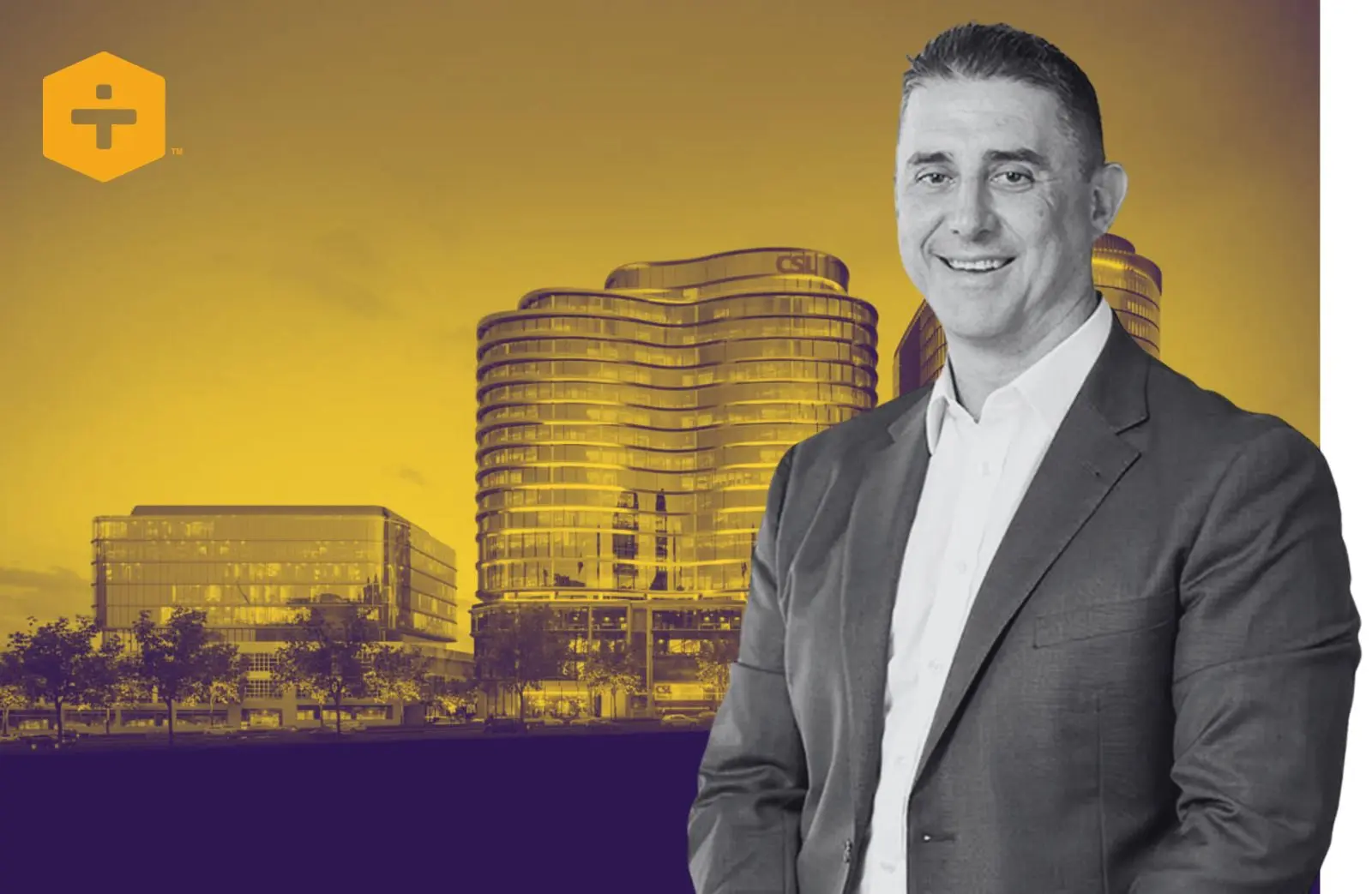


“It’s been challenging, turbulent, exciting and fun.”
After just 13 months in the top job at Roberts Co, chief executive Matt Bourne has weathered some of the most challenging times in the construction industry at the helm of the billion-dollar business.
“I felt like I needed some deep-end swimming,” he jokes.
Bourne had been overseeing the delivery of Allianz Stadium with John Holland when he was tapped for the role of chief executive at the five-year-old business.
“The true story is I said no [to the job] first of all to the recruiter,” Bourne says.
And then he handed the job description to his wife who told him in no uncertain terms that this was his moment and to take the job.
Far from the suits and CBD offices, back in 1994 Bourne let his fingers do the walking in the tome that was the Yellow Pages and cold called builders for a job.
A.W. Edwards answered the call and a young Bourne, who was in his final year of school, had his first construction gig, provided he made it into a construction management university course at the end of the year.
So began a 25-year career with A.W. Edwards. Bourne says he learned a great deal from the ground up in the 100-year-old construction firm.

▲ Bourne worked to deliver the Allianz Stadium with John Holland. Source: Cox Architecture
Bourne then moved to John Holland, which he says gave him good exposure to the Tier.1 construction industry, before taking over the reins of one of the country’s newest construction firms from his predecessor, Alison Mirams.
Mirams helped spearhead a move to scoop up the failed Probuild projects in Victoria, which also brought boutique construction firm Monaco Hickey under the Roberts Co umbrella.
Roberts Co did a rinse and repeat last year when Lloyd Group hit the canvas, expanding the company’s exposure to Victoria’s big education build-out and deploying its on-the-ground capabilities with Monaco Hickey.
While Bourne is not keen to see more big construction companies crash, he says it was a good outcome for subcontractors who were able to be retained on some of those bigger jobs.
“We’re in a fantastic position, we are sitting between $900 million and $950 million in revenue,” Bourne says.
“We are focused on winning more and bidding less. The tendering market is very challenging and we are selective about what we go for and who we will work with.
“We don’t want to be in the race to the bottom. We want to work in an industry making sure everyone is viable and profitable. Profit is not a dirty word. I’m happy to lose a job on the wrong risk profile.”
Bourne says Roberts Co is regularly approached by administrators and flagging construction firms about taking on their workbooks. He says they “always take a look … but it’s got to make sense from a strategy point of view”.
Wafer-thin profit margins are doing nobody any favours and Bourne says it is unfair on the building industry to wear all the risk exposure.
He says the days of being slapped with a “big, hard contract stick” are numbered as feasibility inputs become more challenged and developers and governments look more favourably upon rise-and-fall clauses in contracts.
“We want the right work and we want the profitability,” he says.
“No one wants a builder to go under, the ripple effect is large. Excluding overheads I believe profit margins should be at 5 or 6 per cent but it depends on the risk profile of individual projects.
“Having a healthy margin means a business can be viable.”

▲ Roberts Co is building Australia’s biggest warehouse for Amazon at the Craigieburn Logistics Estate in north Melbourne.
Bourne says they sometimes lose bids because other groups come in and “say yes to everything” but he believes risk-sharing is the future of the industry.
“This is going to be a year of stabilisation and profitability but Covid has had a longer tail than we thought. I’m worried that there will be more insolvencies that could impact the industry but we are headed in the right direction.”
Although the group has historically taken on education and healthcare, they are moving more into life sciences, data centres and industrial space, with an appetite for build-to-rent and hotel projects into the future.
Bourne says one of the more exciting projects on the books is Australia’s largest warehouse. Roberts Co broke ground on the ambitious Logos shed at Craigieburn in Victoria late last year. Amazon is lining up its robots for its biggest automated fulfilment centre in the country, the size of 11 MCG stadiums.
“We’re a $1-billion business, we are an agile and growing Tier.1 builder, and we are in three states now,” Bourne says.
“Perth is a new market for us. It’s a bit of a homecoming for the Roberts name with the Roberts family home base in Perth.
“I would have two or three calls a week from people looking for us to take on jobs in Queensland. But the market needs to be a bit more stable there for us to look at it.”
And on that well-publicised Gurner merger? Don’t believe everything your hear, Bourne says.
Article written by Taryn Paris for The Urban Developer on 08.04.24